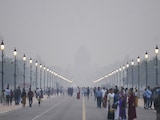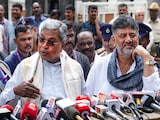Ten policemen and their driver were killed on Wednesday when their minivan was blown up by an improvised explosive device (IED) in the Bastar district of Chhattisgarh, officials said.
The policemen were returning from an anti-Maoist operation that was launched after intelligence inputs when they came under attack around 2 pm, they said.
The area where the blast took place is around 450 km from state capital Raipur. TV footage from the scene showed a huge crater, almost 10 feet deep, splitting the road at the site. The vehicle was completely destroyed in the attack.
The policemen belonged to the District Reserve Guard (DRG), a special force of the Chhattisgarh police that comprises mostly local tribals who have been trained to combat Maoists.
The DRG has been instrumental in several successful operations against the rebels in Bastar, a hotbed of left-wing extremism.
Union Home Minister Amit Shah spoke with Chhattisgarh Chief Minister Bhupesh Baghel following the attack and assured all possible help.
Prime Minister Narendra Modi tweeted, "Strongly condemn the attack on the Chhattisgarh police in Dantewada. I pay my tributes to the brave personnel we lost in the attack. Their sacrifice will always be remembered. My condolences to the bereaved families."
Mr Baghel said, "The news of the martyrdom of our 10 DRG jawans and a driver due to an IED blast targeting the DRG force which had arrived for an anti-Naxal operation on the information of the presence of Maoist cadre under Aranpur police station area of Dantewada is very sad. We share the grief of their families. May their soul rest in peace."
The attack was the worst in two years. In April 2021, at least 22 police personnel were killed by Maoist fighters during an anti-insurgency operation in Chhattisgarh's Sukma district.
In the preceding month, five policemen were killed, and several others injured in a blast in the state's Narayanpur district that local police said was a Maoist strike targeting a bus carrying more than 20 police personnel.
The Maoists, also known as Naxals, have waged an armed insurgency against the government that has killed hundreds of people over six decades. They say they are fighting on behalf of the poorest, who have been left out of the country's economic boom.
Since 1967, the group seen as the greatest threat to the country's internal security have asserted control over vast swathes of land in central and eastern India, establishing a so-called "red corridor". They operate from thick forests, and their operations against the Indian administration and forces are shrouded in secrecy.















